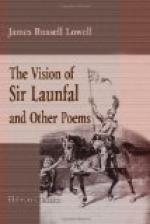“Springtime
ne’er denied
Indoors by vernal Chaucer,
whose fresh woods
Throb thick with merle and
mavis all the year.”
But books could never divert his soul from its early endearments with out-of-door nature. “The older I grow,” he says, “the more I am convinced that there are no satisfactions so deep and so permanent as our sympathies with outward nature.” And in the preface to My Study Windows he speaks of himself as “one who has always found his most fruitful study in the open air.” The most charming element of his poetry is the nature element that everywhere cheers and stimulates the reader. It is full of sunshine and bird music. So genuine, spontaneous and sympathetic are his descriptions that we feel the very heart throbs of nature in his verse, and in the prose of such records of intimacies with outdoor friends as the essay, My Garden Acquaintance. “How I do love the earth,” he exclaims. “I feel it thrill under my feet. I feel somehow as if it were conscious of my love, as if something passed into my dancing blood from it.” It is this sensitive nearness to nature that makes him a better interpreter of her “visible forms” than Bryant even; moreover, unlike Bryant he always catches the notes of joy in nature’s voices and feels the uplift of a happy inspiration.
In the presence of the immense popularity of Mark Twain, it may seem paradoxical to call Lowell our greatest American humorist. Yet in the refined and artistic qualities of humorous writing and in the genuineness of the native flavor his work is certainly superior to any other humorous writing that is likely to compete with it for permanent interest. Indeed, Mr. Greenslet thinks that “it is as the author of the Biglow Papers that he is likely to be longest remembered.” The perpetual play of humor gave to his work, even to the last, the freshness of youth. We love him for his boyish love of pure fun. The two large volumes of his Letters are delicious reading because he put into them “good wholesome nonsense,” as he says, “keeping my seriousness to bore myself with.”
But this sparkling and overflowing humor never obscures the deep seriousness that is the undercurrent of all his writing. A high idealism characterizes all his work. One of his greatest services to his country was the effort to create a saner and sounder political life. As he himself realized, he often moralized his work too much with a purposeful idealism. In middle life he said, “I shall never be a poet until I get out of the pulpit, and New England was all meeting-house when I was growing up.” In religion and philosophy he was conservative, deprecating the radical and scientific tendencies of the age, with its knife and glass—
“That make thought physical
and thrust far off
The Heaven, so neighborly
with man of old,”
The moral impulse and the poetic impulse were often in conflict, and much of his early poetry for this reason was condemned by his later judgment. His maturer poems are filled with deep-thoughted lines, phrases of high aspiration and soul-stirring ecstasies. Though his thought is spiritual and ideal, it is always firmly rooted in the experience of common humanity. All can climb the heights with him and catch inspiring glimpses at least of the ideal and the infinite.




